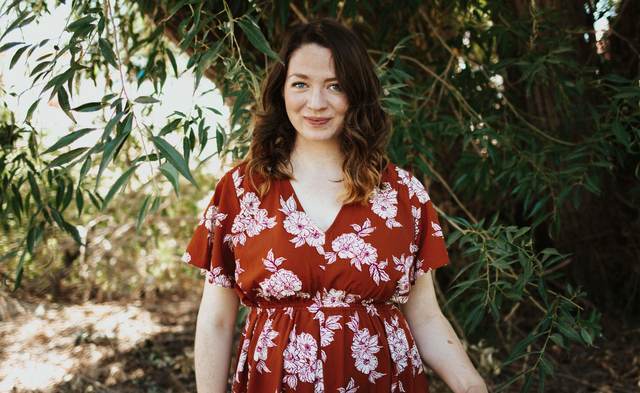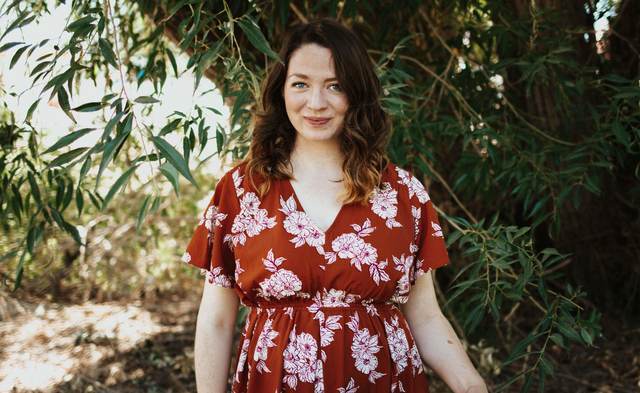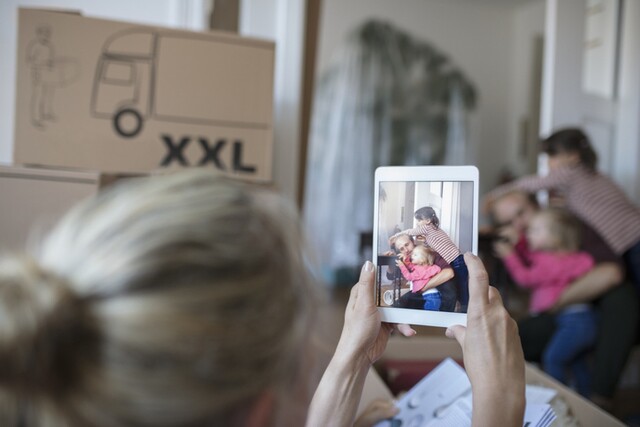While once we viewed the world only through our two round eyes, now we examine it through thousands of tiny squares, perfectly cropped and curated, through which we look, scroll, admire, and double-tap. I mean, if you did not put it on your Instagram story, did it really happen? If you don’t have a “K” attached to the number beside your name, are you really an influencer? In our society of travel bloggers and “momfluencers,” where anyone and everyone can be a star (as long as the algorithm says you are), are we truly being #authentic?
I was lying in bed this morning, alone with myself, my thoughts, and my sweet baby bump. I watched the rise and fall of my stomach, tilted slightly to the left where my baby’s head was situated nice and snug. I thought of the dreams I have for my son. I thought about who he will be and the kind of childhood I want to give him.
Can I be honest? I didn’t picture mess-free insta-squares of craft time. I didn’t see picnics in matching outfits or a perfectly curated feed of memories.
I am pretty sure this boy will be stubborn like my husband and opinionated like me. So, I see messes and tantrums but also cuddles and playtime. I picture us reading together, running together, napping together. I see poorly drawn fridge art that is more imaginative than insta-worthy and nights spent in Narnia and Neverland, not the Gram.
The Face of Instagram’s New Superstars
For the first time in its history, the models of Instagram have drafted a new kind of superstar. May I introduce you to one? Let’s call her Olivia. She frequently stars in her mother’s Instagram, although she now has one of her own as well. At 3 years old, she has more fans than people she has ever set her eyes on. She is famous before she can even spell the word. And she is not alone. Thousands of children just like her grow up learning how to pose “just so,” knowing precisely where to put their hand or how to move their head so mom can get a better picture.
Many of these children have their own Instagram account before they even know what an “account” is and long before they can consider their own privacy and what they are and are not willing to make public about their life. Many of them know how to create an “authentic” picture-perfect moment, being bred for fame from the moment they drew breath and gained the attention of all of mom’s followers.
Is it really so bad, so worrisome, that our children are making such a bold appearance on social media? What harm can come from posting photos of an adorable 5-year-old after all? Why not invest time in curating a space where young moms like me can share the most beautiful part of our lives—our children?
This situation may be more complex than the question implies. Simply put, there is nothing inherently wrong about taking a picture. Nothing worrisome about sharing a post. Real connection can be built through Instagram. Through this medium, I have developed friendships online with other moms and entrepreneurs who share my vision—relationships that never would have occurred if not for the “Gram.” This little app has enriched my life and has given me greater access to people worldwide that I care about, who care about me, and who do not want something as simple as distance to prevent them from watching my son grow up.
Yet we should consider treading very lightly when posting. We must consider whose photo we are posting, when, and most especially, why we are posting. Is this post for our children, our family? Is it part of the record of our lives, thoughtfully shared at a time that does not disrupt the real rhythms of our lives? Or is it for us? Is even a small part of us hoping our feed competes with the other perfect family feeds we follow? Are we Brady-Bunching our lives to prove something, and if so, to whom?
How Comparison Culture Can Impact Your Family
It is dangerous to dive into the culture of comparison when we have our children holding our hands. Research has for years shown that both parents struggle when they engage in comparison culture, which may negatively impact both maternal mental health and the romantic relationship between mothers and fathers,1 both of which have consequences on the type of parenting outcomes that emerge between parent and child. Comparison culture does not stop there, however—it may also negatively impact child and teenager peer relationships,2 increasing feelings of envy and jealousy among friends.
In the past, problems surfaced mainly between a parent’s comparison between two of their children, thus creating opportunities for envy and enmity between a child and their sibling;3 yet this new world filled with thousands of tiny squares has opened up whole new areas for young children to compare themselves not only to someone they love but to someone they do not even know. The opinions of strangers matter to children who understand what a “like” is.
As an adult, it is hardly news to me that my phone is addicting, that I use it to self-soothe, to entertain me when I am bored and want to pass the time. Psychotherapist Kristen Howerton suggests that this can be a problem when our actions give others the perception that we value our distractions over our relationships.4 Few people actually value their social lives online over the people in their lives, but the danger of distraction is that it gets in the way of what we love most and distracts us just long enough to communicate a message.
So the question is: What message are we communicating to our children?
I am saying this because I want my son to know how to play without posing for a picture. I want him to grow up craving cookies instead of fame. I want him to have the freedom to wear what he wants, even if it is not on brand, organic, or within the color scheme of my feed. As adults, the insta-game may distract us from our laundry, our chores, and the daily exercise routine that we still want to feel motivated to do. Is it also distracting us from our child? Are we giving our child the gift of our presence or our presets?
As children, the insta-game may distract from imaginative play. It’s all good and fun to build a fort in the living room, but soon after you snap that sweet photo of them, does your child come wriggling up to you to ask if people liked what she made? Or does the picture become a sweet memory the two of you can reflect on for years to come?
An Underutilized Tool to Help Us Keep Perspective
I am not saying there is a perfect answer that will allow us to share our sweet memories without ever impacting our children. I do believe, however, that there is an underutilized tool that may help us keep perspective.
This tool was born from a memory I have of my own childhood. I was living in a downstairs bedroom at the time, in a tiny room with walls the color of peach and pine and a mini wardrobe I used to pretend to travel to Narnia, just like in my books. My favorite part of the room, however, was the secret space above one of my shelves. I discovered one day, quite by accident, that the roof of the top shelving was resting, but not glued, into place. If I pushed on it, I could slide it back and had a secret “compartment” where I could put anything I wanted. I swooned over this knowledge. As a young 9-year-old, I had nothing of value to hide in my secret spot beyond candy bars and notes about boys, but the fact that it existed, that I had a secret space that no one else knew about, was so exciting and special to me.
Perhaps this is a part of the answer to this complicated question. Perhaps we can find balance by creating a secret, special space between us and our children. We can create large pockets of the day that the internet will never see, that our followers are unaware of. We can discard the need to share their every accomplishment, thus reducing the need to “overshare” and giving ourselves the mental space to celebrate our children’s achievements without seeking the applause and acclaim of others. We may find these moments to be even sweeter than seeing those likes and comments roll in.5
Our children see us. They interpret what is important to us by what consumes us, and those things become important to them too. If we are always consuming thousands of squares and comments and likes, we should not be surprised when they seek that same thing.
However, if we create that secret space away from the internet, we are free to communicate something quite different. We communicate that what we want most to fill up our life is our child. That they are enough just as they are. That they are special enough to keep us present. We communicate that they are central enough to our world that we do not feel the need to put a hashtag in front of #authentic so that people know we are being real, because our child already knows that we are.
Lead image from Getty Images

1 Dell’Antonia, K. (2019, April 12). Facebook is stealing your family’s joy. The New York Times. Retrieved from https://www.nytimes.com/2019/04/12/opinion/sunday/facebook-privacy-parenting.html
2 Dell’Antonia, K. (2019, April 12). Facebook is stealing your family’s joy. The New York Times. Retrieved from https://www.nytimes.com/2019/04/12/opinion/sunday/facebook-privacy-parenting.html
3 Howerton, K. at TEDxChapmanU (2013, June). Social Media-Sucking Time or Saving Lives [Video file]. Retrieved from https://www.youtube.com/watch?v=4hFimIczB0s
4 Prescott, M.H. (2015, July 30). BYU Study Examines Parental Comparisons Between Siblings. Church News. Retrieved from https://www.lds.org/church/news/byu-study-examines-parental-comparisons-between-siblings?lang=eng
5 Coyne, S. M., McDaniel, B. T., & Stockdale, L. A. (2017). 'Do you dare to compare?' Associations between maternal social comparisons on social networking sites and parenting, mental health, and romantic relationship outcomes. Computers in Human Behavior, 70, 335-340. doi:10.1016/j.chb.2016.12.081[ii] Charoensukmongkol, P. (2018). The impact of social media on social comparison and envy in teenagers: The moderating role of the parent comparing children and in-group competition among friends. Journal of Child and Family Studies, 27(1), 69-79. doi:10.1007/s10826-017-0872-8


